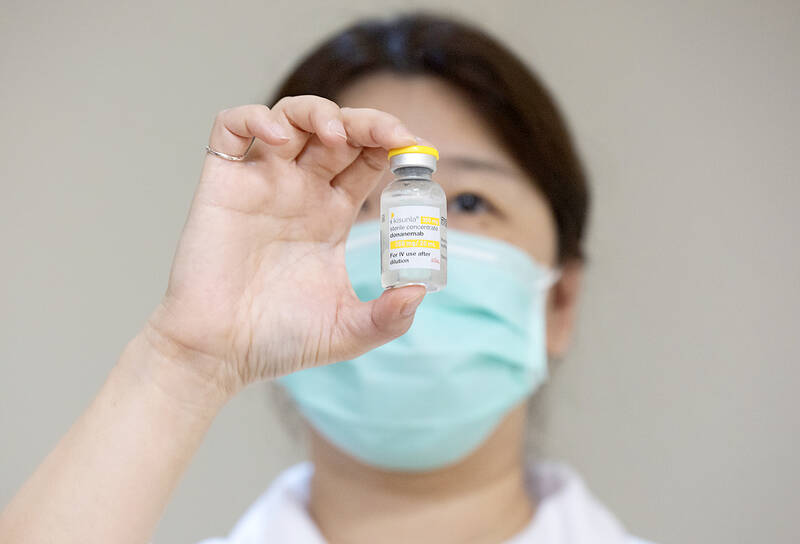As Taiwan begins administering two newly approved drugs for early-stage Alzheimer’s disease, more accurate diagnostic tools are needed to identify suitable patients and guide treatment decisions, medical experts said.
Kisunla, developed by US pharmaceutical company Eli Lilly, and Leqembi, jointly developed by Eisai in Japan, Biogen in the US and BioArctic in Sweden, were approved by the Food and Drug Administration (FDA) earlier this year for use.
The US Food and Drug Administration approved Kisunla last year and Leqembi in 2023.

Photo: CNA
Some patients in Taiwan began receiving the two drugs last week, but are doing so at their own expense, because the drugs are not covered by the National Health Insurance system.
A standard 18-month course for each of the two drugs costs about NT$1.5 million (US$51,405).
Diagnosing Alzheimer’s is difficult, and precise biomarkers are needed to assist physicians in making accurate assessments, Kaohsiung Chang Gung Memorial Hospital Department of Neurology deputy director Chang Chiung-chih (張瓊之) said.
To accurately identify the disease, doctors often need to spend a lot of time communicating with a new patient’s family and asking about the patient’s daily functioning, including asking whether they can still shop for groceries or perform basic calculations by themselves, Chang said.
With the two newly approved drugs for early-stage Alzheimer’s beginning to be administered across Taiwan, more accurate diagnostic tools are needed to identify patients in the early stages who are suitable for treatment, she said.
Researchers believe that Alzheimer’s disease is caused by the combined accumulation of amyloid and tau protein in the brain, and that the presence of tau protein is closely linked to the onset of symptoms — the broader the tau spread, the more severe the cognitive decline, she said.
Chang said that based on the correlation between tau protein deposition and the onset of Alzheimer’s, she hoped that in the future medical imaging for tau protein would enable earlier detection and help predict disease progression.
Current diagnostic methods for Alzheimer’s rely on assessment scales and clinical guidelines to determine whether a person “very likely” has the disease, Taiwan Dementia Society president Hsu Jung-lung (徐榮隆) said.
Biomarkers are critical to confirming an Alzheimer’s diagnosis, and such indicators could help determine whether a patient is eligible for the new treatments that might slow the disease’s progression, he said.
Jang Ming-kuei (張明奎), founder of transnational biotech company Aprinoia, said a tau protein imaging agent developed by the company can visualize tau protein accumulation in the brain, but the agent is still undergoing clinical trials.
The company is in discussions with the FDA regarding its drug approval application, including the submission of safety and efficacy data, Jang said.
An estimated 350,000 people in Taiwan have some form of dementia, with 60 to 70 percent of them having Alzheimer’s. About half, or fewer than 100,000 patients, might qualify for the new treatments, said Yan Sui-hing (甄瑞興), director of Far Eastern Memorial Hospital’s dementia center.

A preclearance service to facilitate entry for people traveling to select airports in Japan would be available from Thursday next week to Feb. 25 at Taiwan Taoyuan International Airport, Taoyuan International Airport Corp (TIAC) said on Tuesday. The service was first made available to Taiwanese travelers throughout the winter vacation of 2024 and during the Lunar New Year holiday. In addition to flights to the Japanese cities of Hakodate, Asahikawa, Akita, Sendai, Niigata, Okayama, Takamatsu, Kumamoto and Kagoshima, the service would be available to travelers to Kobe and Oita. The service can be accessed by passengers of 15 flight routes operated by

Chinese spouse and influencer Guan Guan’s (關關) residency permit has been revoked for repeatedly posting pro-China videos that threaten national security, the National Immigration Agency confirmed today. Guan Guan has said many controversial statements in her videos posted to Douyin (抖音), including “the red flag will soon be painted all over Taiwan” and “Taiwan is an inseparable part of China,” and expressing hope for expedited reunification. The agency last year received multiple reports alleging that Guan Guan had advocated for armed reunification. After verifying the reports, the agency last month issued a notice requiring her to appear and explain her actions. Guan

GIVE AND TAKE: Blood demand continues to rise each year, while fewer young donors are available due to the nation’s falling birthrate, a doctor said Blood donors can redeem points earned from donations to obtain limited edition Formosan black bear travel mugs, the Kaohsiung Blood Center said yesterday, as it announced a goal of stocking 20,000 units of blood prior to the Lunar New Year. The last month of the lunar year is National Blood Donation Month, when local centers seek to stockpile blood for use during the Lunar New Year holiday. The blood demand in southern Taiwan — including Tainan and Kaohsiung, as well as Chiayi, Pingtung, Penghu and Taitung counties — is about 2,000 units per day, the center said. The donation campaign aims to boost

The Central Weather Administration (CWA) said a magnitude 4.9 earthquake that struck off the coast of eastern Taiwan yesterday was an independent event and part of a stress-adjustment process. The earthquake occurred at 4:47pm, with its epicenter at sea about 45.4km south of Yilan County Hall at a depth of 5.9km, the CWA said. The quake's intensity, which gauges the actual effects of a temblor, was highest in several townships in Yilan and neighboring Hualien County, where it measured 4 on Taiwan's seven-tier intensity scale, the CWA said. Lin Po-yu (林柏佑), a division chief at the CWA's Seismological Center, told a news conference